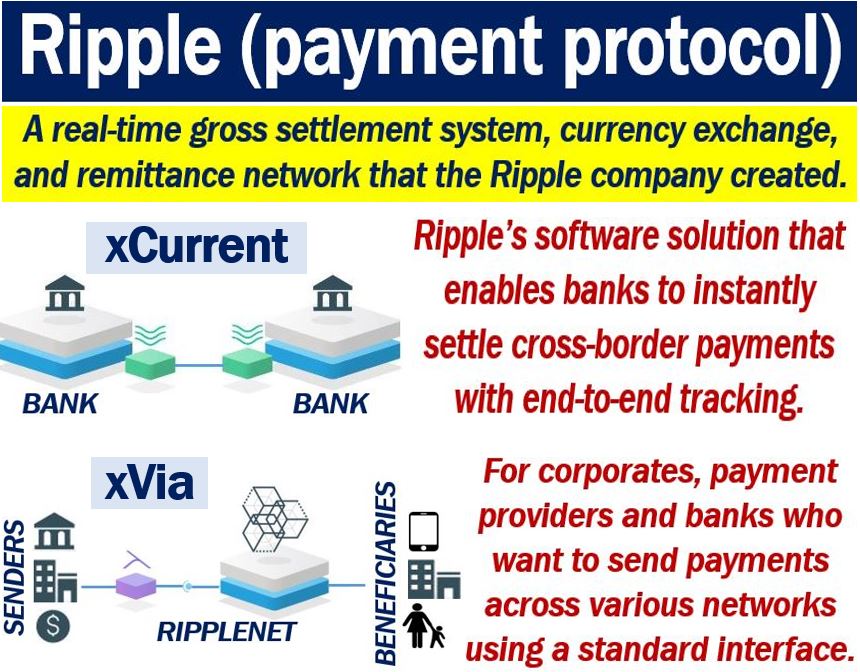Ripple is either a type of digital currency, i.e., cryptocurrency, or an open payment network. As a digital currency, people often use the abbreviation XRP. It is a currency exchange, real-time gross settlement system (RTGS), and remittance network.
Chris Larsen and Jed McCaleb founded the Ripple company, which has its headquarters in San Francisco, California.
People also refer to the network as RTXP.
Ripple says that its network provides one frictionless experience to send funds across the world using the power of blockchain. A blockchain is a list of blocks (records) that is forever growing.
Within these blockchains, there are fully-automated smart contracts. These smart contracts, which are self-executing, consist of lines of computer code.
The protocol’s creators say that they aim to help people break free of the financial networks’ current ‘walled gardens.’
They say that, for example, banks, PayPal, credit cards, and other financial institutions restrict access. Specifically, they restrict access with fees, process delays, and currency exchange charges.

Ripple and cryptocurrencies
Ripple XRP is a cryptocurrency, i.e., one of many types of digital money. Digital money is money that only exists electronically that can be bought on an exchange.
The creators of cryptocurrencies, which have been around since 2009, designed them to be ultra-secure.
Cryptocurrencies are online currencies that use cryptography (sophisticated codes). Their encryption makes it virtually impossible for counterfeiters to make fake versions or manipulate them.
In most cases, they are completely anonymous, i.e., people who use them can do so without revealing their names.
Unlike traditional currencies such as the dollar, pound, or euro, cryptocurrencies have no central bank regulating them.
Is it a cryptocurrency or not?
In a Bitcoin Magazine article, Shawn Gordon makes the following comment regarding Ripple and cryptocurrencies:
“Technically speaking, is Ripple a cryptocurrency in the mold of Bitcoin? The short answer is probably ‘no,’ but that doesn’t stop it from often being lumped into that same category.”
Ripple is an Altcoin. Altcoins are all cryptocurrencies except for Bitcoin. ‘Altcoin’ is short for ‘alternative coin.’
If you want to enter the world of cryptocurrencies, you will need a cryptocurrency wallet. Without one you will not be able to buy, sell, and store cryptocurrencies.
Ripple concept
Ripple is an open-source protocol. It is a basic infrastructure technology for transactions between banks. It is “a neutral utility for financial institutions and systems,” says the company’s website.
The protocol allows both banks and non-bank financial services firms to incorporate the payment protocol into their internal systems. Therefore, the institutions’ customers can use the service.
For a transaction to occur, there must be two parties; a regulated financial institution and a ‘market maker.’ Currency trading desks and hedge funds, for example, are market makers.
The financial institution holds funds and issues balances on behalf of their customers. The market makers, on the other hand, provide liquidity.
Ripple, at its core, bases itself around a shared, ledger or public database that has its contents decided on by consensus.
Regarding what Ripple does for payments, the Consultative Group to Assist the Poor (CGAP) once said:
“Ripple does for payments what SMTP did for email, which is enable the systems of different financial institutions to communicate directly.”
Its global connectivity does away with the reliance on third parties. It also minimizes or eliminates many of the risks, costs, and delays people have had to face when sending money.
They added that the system:
“Provides connectivity at the settlement layer of a payment network – the foundational layer. This enables each network’s existing rules, processes, and messaging standards to remain in place.”
